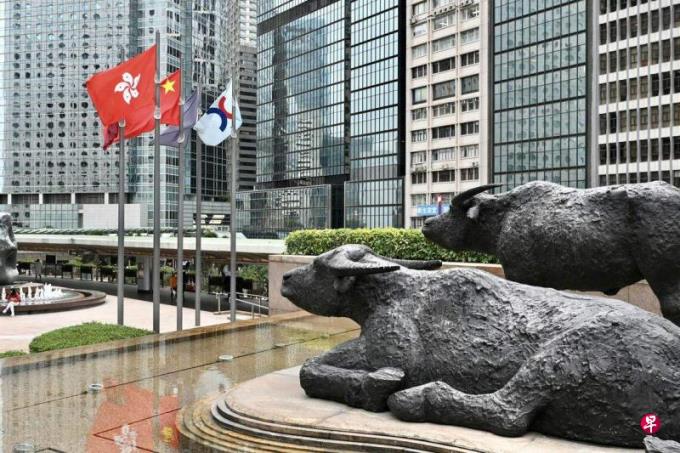
The 3000 -point defense war in the Chinese stock market, from 2023 to 2024.In the first week of the year, A shares ushered in the opening of the door, but "the door green".Can the Chinese stock market reverse the decline in the New Year?How much room for official market rescue measures?Which plates have more potential?
"If you want to make money from your stock, learn to lose first."
The lines in the flowers of the TV series are now the self -consolation of Chinese shareholders' first day in 2024.
On this day, the Shanghai Securities Comprehensive Index failed to continue the rise of the last week of last year. Instead, it fell from 2974.93 to 2962.28 points, a step away from the 3,000 point.
The "A -share" entry once again rushed to the Weibo hot search list.Some netizens laughed at themselves: "On the first day of 2024, I still wanted to make money, and I only wanted to return the book the next day." Some people pointed out that the A -shares in the past three rounds of bull markets have begun to "open the door green"; according to this logic, This year will definitely "get rid of the bear into the cattle".
The Chinese stock market with a constant twists and turns will usher in the new year of the new year in the expectations of shareholders; or will it continue last year's decline and explore new lows?
At the beginning of 2023, investors were confident in the Chinese stock market. In the year when the anti -control and re -opening of the country, the stock market would usher in retaliated rebounds as the economy.
They did not expect that by the end of the year, the Chinese stock market became the worst market in the Asia -Pacific region.The three major A -share indexes have been fully slipped, and the Shanghai and Shenzhen 300 indexes with a decline of more than 11 % have fallen for the third consecutive year; the Hong Kong Hang Seng Index has recorded nearly 14 % of the decline.
This year's stock market trend is roughly consistent with the dynamics of China's economy.The above certificate index is an example. In the first half of the year, the economic rapid recovery and optimistic expectations drove the influx of foreign capital. The stock market raised it.In the second half of the year, China ’s shrinkage risk rose, the property market was weakened, local debt was high, the RMB depreciated increased ... Under multiple pressures, the Shanghai Stock Exchange Index shook down, fell below 3,000 points in October, and at the end of December, it fell below 2,900 points.
The external environment is not friendly to the Chinese stock market
At the same time, the external environment is not friendly to the Chinese stock market.The pace of interest rate hikes in the US Federal Reserve has accelerated, attracting funds to return from emerging markets to the United States, which has continued to pressure A shares; the Sino -US game has continued to upgrade, driving foreign capital to accelerate outflow.The "north -directional capital" of overseas investors bought mainland stocks, cumulative net purchase of 43.7 billion yuan (RMB, Same, Sim, Sim of 8.28 billion yuan) in 2023, which was a new low in Shenzhen and Hong Kong Connect in seven years.
Optimistic analysis believes that the current Chinese stock market has built the bottom, which is a good time to take advantage of the low suction.Ma Lei, the chief investment officer of Mainland China and Hong Kong, pointed out that the MSCI Chinese market index is about 45%lower than the MSCI US market index.Based on the price -earnings ratio and the municipal net ratio assessment, the current valuation of the Chinese stock market is at the lowest level in 10 years, and the risk return of investment in Chinese stocks is attractive.
Financial data company FactSet data shows that the average expected price -earnings ratio of the Hang Seng Index ingredient stocks is 8 times, which is close to the lowest level in at least 20 years.
Bloomberg survey at the end of December for 417 investors showed that low valuation increases the attractiveness of the Chinese market.Nearly a third of the interviewees plan to increase investment in Chinese stocks in the next year, which is much higher than 19 % in August.
However, investors who entered the market a year ago were not sweet but bitter.Compared with the time, what major changes will happen in the Chinese stock market this year?
Economic and geopolitical factors around the market
The CITIC Investment Research News pointed out that at least two major factors have improved this year. One is that as the Fed ’s interest rate hike cycle has gradually ended, the global liquidity environment is expected to improve.Improvement of consumers and corporate confidence.Under the blessing of the above factors, it is expected that the increase in A -shares will be flat and high, and it is expected to enter the bull market in the second half of the year.
The macro team of Minsheng Bank believes that the trillion special Treasury bonds and special recycling bonds issued at the end of last year will enter the phase of capital expenditure, which will help the overall liquidity environment loose;"Xiaoyangchun"; Sino -US relations are expected to gradually recover with the meeting of the two heads, which helps China to import and export.The Chinese stock market is expected to rebound this year.
Compared with the general optimism of Chinese institutions, international investment banks have different views.Goldman Sachs predicts that the CSI 300 Index will rise by 16%this year. UBS expects that the MSCI China Index will have a 15%room for room. Morgan Stanley is carefully expected that the MSCI China index will rose only 5%, and the Shanghai and Shenzhen 300 increase will be 7%.
Morgan Stanley analysts believe that China's economic recovery is still slow and it is difficult to convince the market. It is expected that the stock market will fall further in the next few months.Huang Yonghui, a SAXO market strategist, also pointed out that China needs more time to reorganize the real estate industry and solve local government debt issues. The Chinese stock market, including Hong Kong, is expected to bottom out in 2024.
Economic prospects are still unclear, and geopolitics uncertain factors have not faded.Chen Lizi, the director of investment research and fund rating agency Morningstar, analyzed the Lianhe Zaobao as an Asian stock research director that the upgrade of the Harbin conflict may lead to the rise in fuel prices and impact the global economic growth; the political game before the US election may give birth to more policies for China,Make geopolitical risks high.
Li Yilai, the chief investment strategyist of Bank of Singapore, said in an interview that China's gross domestic product (GDP) may reach 5.4%last year, but market confidence continues to be sluggish, especially in the property market.Weak and exports may be blocked due to the slowdown of the global economy."We predict that China's GDP growth rate will slow to 5 % this year, and the official still needs to introduce more fiscal, currency and real estate easing policies to support growth."
The emotions of the stock market intuitively reflect investors' confidence in the economy.In China, this confidence is often highly linked to macro policies.But the market is not very appreciated with the favorable policies issued last year.
After the meeting of the Political Bureau of the Communist Party of China in July last year, the official was officially introduced to stimulating policies for the fields of property markets, foreign investment and private economy.
Taking the stock market as an example, the China Securities Regulatory Commission launched a package of measures in August, including reducing transaction stamp duty, staged tightening of the first public sales (IPO) rhythm, and limiting major shareholders' sales.However, whether it is the official statement or the policies introduced, the stock market rebound is like a flash in the pan, and it fell quickly after the short -term rushing.
On the other hand, policy uncertainty is becoming an increasingly concerned risk of investors.Following the impact of policy impacts such as the Internet and education and training, the draft online game management measures released two weeks ago also triggered the stock price of the game sector.Tencent's Hong Kong stock market has evaporated HK $ 367 billion (about S $ 62.2 billion) within a day, and NetEase's stock price has fell more than 24 %.

Scholars: Stimulating policy Lack of coordination and difficulty forming a joint force to boost the market
Fu Fangjian, an associate professor of Li Guangqian Business School of Singapore Management University, pointed out in an interview that the stimulus policies have emerged endlessly in the past six months, but they are more "sewing, small troubles", and the lack of coordination between policies and difficulty forming joint efforts."To relax the purchase restriction measure today, and tighten game control tomorrow, it will dispel the role of boosting confidence in the market."
He believes that the central government's too tight economic management will lead to the increasing demand for the industry's stimulus policy, and the weaker pressure resistance."Policy makers should delegate power appropriately, and the private economy is rejuvenating from the bottom up."
The CPC Central Committee Economic Work Conference held last month emphasized that it is necessary, Ensure that "the same direction and formation force."
At the beginning of the New Year, investors turned their attention to the upcoming National Council (the National People's Congress and the CPPCC Annual Meeting), as well as the clue of the Third Plenary Session of the 20th CPC Central Committee of the Communist Party of China, looking forward to finding clues to economic growth and stimulating policies.Xie Dongming, director of the Greater China Studies of the Overseas Chinese Bank of Singapore, pointed out that official efforts in anti -system are an important observation point.
Xie Dongming pointed out in an interview that China's actual economic growth was not low last year, but due to the failure of reflation, the nominal GDP increase was lower than the actual GDP increase, which caused market confidence to suffer.To a certain extent, because the policy is mismatched, the money has reached the supply side, but it has not reached the demand side. Therefore, although employment has improved, domestic demand has not effectively expanded.
"Whether the policy can be used for the right medicine this year and leading China out of the shadow of shrinking is important."
The story of Fanhua began in Shanghai in 1992. That year, the Chinese stock market ushered in the first bull market in history.The TV drama Baiken saw the mountains, saying that about 100 years of history, the Dow Jones Index, was only 3,300 points at the time; the Shanghai Stock Exchange Index was close to 1,000 points."Everyone is equal in front of the opportunity. Seizing the opportunity may change your life."
32 years later, the Dow has exceeded 37,000 points, and the Shanghai Stock Exchange Index is still struggling on the 3000 -point line.Entering the Chinese stock market in the new year is still waiting for a chance to turn over.
The biggest drag of the market this year is still real estate
The real estate sector that continues to decline last year is expected to be the biggest drag on the Chinese stock market this year.
The statistics of Wind Database (Wind) show that of the 24 industry indexes of A -share last year, 22 industries have closed down.The best -performing communications industry rose more than 23 %; the index of beauty care and business retail industry index fell more than 30 %, and the real estate index fell more than 26 %.
If there are many Hong Kong stocks listed by many mainland housing companies, the decline of the real estate sector is more obvious.Kerry monitoring data shows that as of December 18 last year, the total market value of 181 real estate stocks listed on the two places listed in Lugang was 27.75 % from the beginning of the year.The Mainland Real Estate Index in Hang Seng fell 30.9%last year, which is the industry with the worst HSI.The stock price of China Evergrande, which was listed in Hong Kong, fell 86%since the recurrence of last August, and Country Garden fell 71%.
Although the property market has been introduced densely from the central to the local governments since the second half of last year, the property market has not yet increased its gas market.Investment banks and securities firms such as Goldman Sachs, Morgan Stanley and UBS generally predict that the real estate industry will shrink for the third consecutive year this year, and record the longest consecutive record.
Bloomberg quoted Alejandra Grindal, Chief Economist of the US Investment Research Agency, said that houses are the largest family assets and the wealth of most people."If it does not grow, it will drag confidence."
Technology stocks are highly optimistic
On the other hand, the technology sector that also fell last year was the high -growth field that many institutions were optimistic this year.The Hang Seng Technology Index fell 8.8%last year, and Alibaba's stock price listed in Hong Kong fell more than 12%throughout the year. Tencent's stock price fell nearly 7.5%.
UBS pointed out in the 2024 strategy report that the Internet is its most promising sector this year: regardless of vertical or horizontal (compared with American interbank companies), the valuation of Chinese Internet companies is currently at a relatively low level.Morgan Stanley pointed out that benefiting from self -rescue measures such as cost reduction and efficiency and repurchase, the performance flexibility of the Internet industry has improved significantly, and the actual performance has been better than market expectations for three consecutive quarters.
Li Yilai, the chief investment strategyist of Bank of Singapore, predicts that this year's A -share market will benefit more from the support of loose policies. Among them, technology, communication services and consumer sectors will perform the best performance.
However, the earthquake caused by a draft of a new draft of a paper online game at the end of December last year, once again made investors realize that Chinese private enterprises, especially emerging industry companies such as Internet, face huge policy uncertainty risks.At the same time, the increase in confrontation between China and the United States in the field of science and technology will also cause Chinese science and technology operators -from semiconductor to the Internet -tolerance geopolitical pressure that is difficult to ignore.




